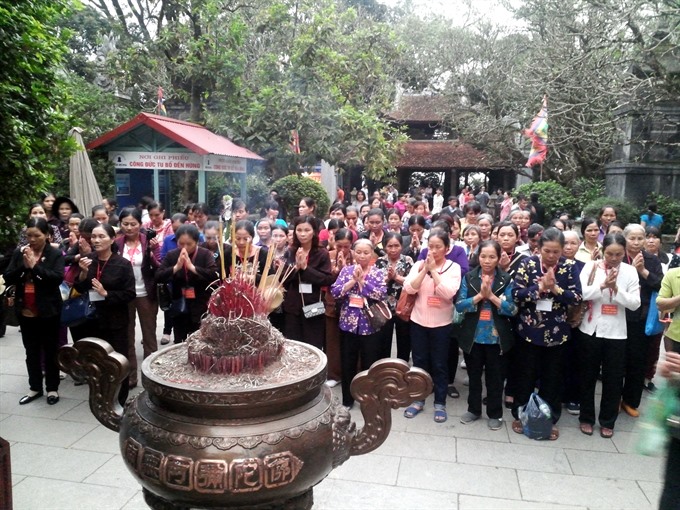 Life & Style
Life & Style

The annual pilgrimage festival honouring the Vietnamese people’s ancestors, the Hùng kings, will be held in the northern province of Phú Thọ between April 21 and 25, 2018.
 |
| Devoted: People pay a visit to the Hùng Temple Complex in Phú Thọ Province during last year’s festival. — VNS Photo Đoàn Tùng |
HÀ NỘI — The annual pilgrimage festival honouring the Vietnamese people’s ancestors, the Hùng kings, will be held in the northern province of Phú Thọ between April 21 and 25, 2018.
The traditional festival is held on the death anniversary of the Hùng Kings—the 10th day of the third lunar month, which falls on April 25 this year.
The event has been observed for thousands of years, displaying the country’s cultural characteristics and consolidating national solidarity.
The festival this year will be hosted by Phú Thọ Province while four other provinces will help organise, including the northern province of Thái Nguyên, central province of Quảng Nam and southern provinces of Bình Dương and Kiên Giang.
Various activities will be held at the Hùng Temple Complex, Việt Trì City, communes surrounding Hùng Temple Complex and temples worshipping the Hùng kings and heroes of Hùng kings era throughout Phú Thọ Province.
According to plan, contributing provinces will join in the worship ceremony and contribute money to cover the organizing expenses and to upgrade the Hùng Temple Relic Site. The provinces will join in various activities during the festival like holding a chưng (square cake) making contest and preparing giầy (glutinous round) cake; exhibit local delicacies at a fair during the event and perform at art shows.
At a recent meeting, authorities of involved provinces agreed on the plan and will promote the festival so that many people all around the nation would join in the event.
Hà Kế San, vice chairman of Phú Thọ Province’s People’s Committee, head of the organising board, asked involved sectors in the provinces to co-ordinate to organise the event.
“Phú Thọ and the contributing provinces will prepare the best conditions to organise a festival successfully, safely, at the lowest costs and leave the best marks in the memories of domestic and foreign tourists,” he said.
Vietnamese legend has it that Lạc Long Quân, son of Kinh Dương Vương, married Âu Cơ, daughter of King Đế Lai. Âu Cơ gave birth to a sack containing 100 eggs from which 100 children were born.
The couple then decided to separate to populate the land, so half the children followed their mother to the highlands and the rest went with their father to the sea.
The first child went with mother Âu Cơ to Phong Châu, now Phú Thọ Province. He then became King Hùng and founded the first nation in the history of Việt Nam, Văn Lang.
Ruling the country for 18 generations, the Hùng Kings taught the people how to grow wet rice. They chose Nghĩa Lĩnh Mountain, the highest in the region, to perform rituals devoted to rice and sun deities to pray for lush crops.
To honour the Hùng Kings, a complex of temples dedicated to them was built on Nghĩa Lĩnh Mountain, and the tenth day of the third lunar month serves as their anniversary.
The worshipping rituals of the Hùng Kings are closely related to the ancestral worship traditions of most Vietnamese families, an important part of people’s spiritual lives.
The worshipping rituals of the Hùng Kings was recognised as UNESCO Intangible Cultural Heritage of Humanity in 2012. — VNS




